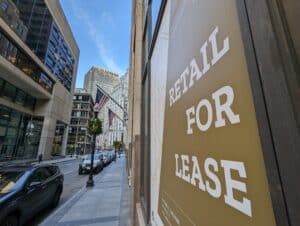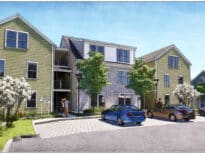A new analysis by the Massachusetts Taxpayers Foundation wades into the debate over Boston commercial property taxes, arguing the city’s downtown faces long-term challenges just as bad or worse than other major American metros.
The business-backed, nonpartisan group cites a range of data to argue that Mayor Michelle Wu’s proposed increase in the commercial property tax rate – state legislators’ sign-off is still needed before July 31 – would set back efforts to repair the city’s finances and restore downtown Boston to its pre-pandemic vibrancy.
“Do these policies achieve these goals without creating or exacerbating other problems? No, they create their own challenges,” MTF President Doug Howgate said in an interview, referring to the proposed tax rate increase and a proposal floated by both Wu and Gov. Maura Healey to tax high-end commercial and residential real estate sales. “There need to be other ways to approach [Boston’s] budget challenges.”
The MTF report broadly echoes a report by the Tufts University Center for State Policy Analysis and the Boston Policy Institute, which predicted the city would face a $500 million shortfall in property tax collections in 2029 thanks to collapsing occupancy in the city’s class B and class C office buildings, severely damaging the revenue they produce and thus their property values.
The mayor’s proposed tax in crease “adds significant additional cost to the property sector facing the gravest long-term challenges,” the report says, while a new real estate transfer tax would “add yet another cost to real estate development that investors would not face in many other markets.”
Boston Faring Worse than Some Peers
Boston faces big, structural challenges, Howgate said, that need to be tackled with a range of strategies.
“The subtext isn’t that a policymaker made bad decisions. This is a fact that the fundamental nature of how we live and work has changed,” he said.
True solutions, he added, are “probably not going to be a [fiscal year] 2025 question, but definitely an FY26 or 27 one.”
Citing a separate December 2023 analysis by professors at the New York University Stern School of Business, the University of North Carolina at Chapel Hill and the Columbia University Graduate School of Business, the MTF report says Boston saw a $32.21 billion drop in the value of its office properties between December 2019 and December 2022, the second-worst among peer American cities behind New York City and typical of most peer cities by percentage of 2019 value lost, aside from outsized percentage losses in San Francisco and dramatically small percentage losses in Charlotte, North Carolina.
Asking rents for class B office buildings in Boston have fallen 15 percent from their pre-pandemic peak, according to commercial brokerage Colliers’ first quarter office market report. At the end of the first quarter, the vacancy rate was 23.1 percent for class A buildings and 28.2 percent for class B properties.
The report also notes, citing data from the Boston Planning & Development Agency, that consumer spending in the city as of last fall had stagnated citywide at slightly below its pre-pandemic average, with the core of downtown Boston seeing a nearly 30 percent decline despite tourism in the city, as measured by passenger traffic at Logan International Airport, having returned to pre-pandemic levels.
Research based on cell phone location data by the University of Toronto cited by the report shows that foot traffic in downtown Boston has plateaued at between 52 percent and 48 percent of pre-pandemic levels since spring 2022, putting the city behind many peers like New York City (between 75 percent and 67 percent of pre-pandemic levels over the same period), Miami (between 70 percent and 60 percent), Austin, Texas (between 48 percent and 60 percent) and Washington, D.C. (between 67 percent and 77 percent). As of the week of June 3, the most recent data available, Boston was lagging behind most other major American cities except Philadelphia, Raleigh, North Carolina, Portland, Oregon and San Francisco.
Call for Biz, City Cooperation
The picture painted in the MTF report contrasts with a more optimistic analysis presented by the Wu administration in an annual BPDA report on the city’s economy released earlier this month.
Howgate credited the administration with trying to find solutions, like proposing zoning to allow for significantly more development downtown, cutting red tape for childcare facilities, rolling out an office-to-residential conversion incentive program and giving grants and technical help to neighborhood retailers that set up shop in the neighborhood.
“The city is working really hard to think through how do we make sure downtown is vibrant. But there’s no quick fixes to these things. This is a fact that the way cities have worked in terms of their downtowns has fundamentally changed from five years ago,” Howgate said.
To deal with these challenges, Howgate said businesses, state leaders and city politicians need to focus on “not making things worse” and look for short-term wins while working collaboratively on long-term problems without fixating on one specific solution. He also urged state leaders to take a fresh look at how much aid Boston gets from Beacon Hill and the city’s ability to raise new forms of tax so it can rely less on property taxes.
“The idea that commercial-residential conversion is a silver bullet, once you look under the hood at what buildings are suitable for that, the cost of that, other requirements like stretch [energy] zoning codes, there are absolutely places where we should be exploring making that happen but we can’t just say we’re going to convert buildings to make 5,000 units and that will solve everything,” he said, adding that construction costs and persistent high interest rates are a serious challenge.







